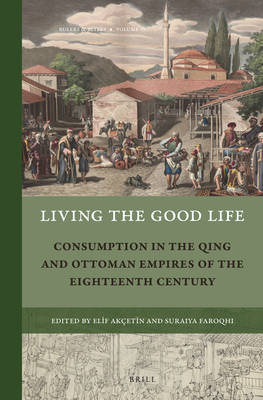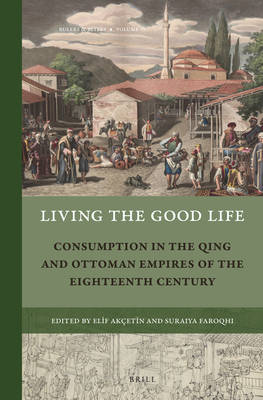
Je cadeautjes zeker op tijd in huis hebben voor de feestdagen? Kom langs in onze winkels en vind het perfecte geschenk!
- Afhalen na 1 uur in een winkel met voorraad
- Gratis thuislevering in België vanaf € 30
- Ruim aanbod met 7 miljoen producten
Je cadeautjes zeker op tijd in huis hebben voor de feestdagen? Kom langs in onze winkels en vind het perfecte geschenk!
- Afhalen na 1 uur in een winkel met voorraad
- Gratis thuislevering in België vanaf € 30
- Ruim aanbod met 7 miljoen producten
Zoeken
Living the Good Life
Consumption in the Qing and Ottoman Empires of the Eighteenth Century
€ 285,45
+ 570 punten
Omschrijving
Eighteenth-century consumers of the Qing and Ottoman empires had access to an increasingly diverse array of goods, from home furnishings to fashionable clothes and new foodstuffs. While this tendency was of shorter duration and intensity in the Ottoman world, some urbanites of the sultans' realm did enjoy silks, coffee, and Chinese porcelain. By contrast, a vibrant consumer culture flourished in Qing China, where many consumers flaunted their fur coats and indulged in gourmet dining.
Living the Good Life explores how goods furthered the expansion of social networks, alliance-building between rulers and regional elites, and the expression of elite, urban, and gender identities. The scholarship in the present volume highlights the recently emerging "material turn" in Qing and Ottoman historiographies and provides a framework for future research.
Contributors: Arif Bilgin, Michael G. Chang, Edhem Eldem, Colette Establet, Antonia Finnane, Selim Karahasanoglu, Lai Hui-min, Amanda Phillips, Hedda Reindl-Kiel, Martina Siebert, Su Te-Cheng, Joanna Waley-Cohen, Wang Dagang, Wu Jen-shu, Yıldız Yılmaz, and Yun Yan.
Living the Good Life explores how goods furthered the expansion of social networks, alliance-building between rulers and regional elites, and the expression of elite, urban, and gender identities. The scholarship in the present volume highlights the recently emerging "material turn" in Qing and Ottoman historiographies and provides a framework for future research.
Contributors: Arif Bilgin, Michael G. Chang, Edhem Eldem, Colette Establet, Antonia Finnane, Selim Karahasanoglu, Lai Hui-min, Amanda Phillips, Hedda Reindl-Kiel, Martina Siebert, Su Te-Cheng, Joanna Waley-Cohen, Wang Dagang, Wu Jen-shu, Yıldız Yılmaz, and Yun Yan.
Specificaties
Betrokkenen
- Uitgeverij:
Inhoud
- Aantal bladzijden:
- 592
- Taal:
- Engels
- Reeks:
- Reeksnummer:
- nr. 13
Eigenschappen
- Productcode (EAN):
- 9789004349384
- Verschijningsdatum:
- 20/10/2017
- Uitvoering:
- Hardcover
- Formaat:
- Genaaid
- Afmetingen:
- 157 mm x 239 mm
- Gewicht:
- 1020 g

Alleen bij Standaard Boekhandel
+ 570 punten op je klantenkaart van Standaard Boekhandel
Beoordelingen
We publiceren alleen reviews die voldoen aan de voorwaarden voor reviews. Bekijk onze voorwaarden voor reviews.








